|
|
|
|
8 November 2005 |
 mail this article mail this article
|
 print print
|  
This article is part of the series: Iraq-US-connection[ 1 - 2 - 3 - 4 - 5 - 6 ]
The case against Saddam in perspective - Part 1
Without the West, no Saddam
Part 2- By Daan de WitWatch the video at the bottom of this articleSaddam is being tried for his crimes, such as for example the poison gas attack in Halabja. But today it will be disclosed that the US used a variant of napalm during the assault on Fallujah last year. And an investigation by the Sunday Herald shows that England has sold chemical weapons to 26 countries, among them members of the 'axis of evil'. Moreover, without the support of Western countries, there would have been no Saddam to speak of, as is made clear in this new article from DeepJournal.
As we reported earlier, the attack on Halabja was carried out by Iran, according to a report by the Pentagon. 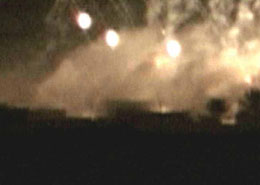 But the use of poison gas has also become a reality in the current war in Iraq, as is made clear (English translation) in the new documentary Fallujah - The Hidden Massacre by the Italian RAI News 24 produced by Sigfrido Ranucci and broadcast today on Italian television. (stream / WMV). 'In soldier slang they call it Willy Pete. The technical name is white phosphorus. In theory its purpose is to illumine enemy positions in the dark. In practice, it was used as a chemical weapon in the rebel stronghold of Fallujah. And it was used not only against enemy combatants and guerrillas, but again innocent civilians. The Americans are responsible for a massacre using unconventional weapons, the identical charge for which Saddam Hussein stands accused,' writes La Repubblica. This is a moral problem that is also playing itself out in England, as witnessed by this headline: UK sells WMD components to ‘axis of evil’ countries. 'Two years ago, the Sunday Herald revealed the extent of the UK's sale of chemical weapons in an award-winning investigation into Britain's chemical bazaar. We revealed that some 26 countries – including Libya, Israel and Iran – were buying chemical weapon components from the UK. The UK has since upped the sale of these components', reported the newspaper in the middle of last year. The US doesn't score much better: 'As well as anthrax and botulism, the USA also sent [when Saddam was in power] West Nile fever, brucella melitensis, which damages major organs, and clostridium perfringens, which causes gas gangrene. [...] Other items which were sent by the US to Iraq included chemical warfare agent precursors, chemical warfare agent production facility plans and technical drawings, chemical warfare filling equipment, biological warfare-related materials, missile fabrication equipment and missile system guidance equipment', wrote de Sunday Herald. But the use of poison gas has also become a reality in the current war in Iraq, as is made clear (English translation) in the new documentary Fallujah - The Hidden Massacre by the Italian RAI News 24 produced by Sigfrido Ranucci and broadcast today on Italian television. (stream / WMV). 'In soldier slang they call it Willy Pete. The technical name is white phosphorus. In theory its purpose is to illumine enemy positions in the dark. In practice, it was used as a chemical weapon in the rebel stronghold of Fallujah. And it was used not only against enemy combatants and guerrillas, but again innocent civilians. The Americans are responsible for a massacre using unconventional weapons, the identical charge for which Saddam Hussein stands accused,' writes La Repubblica. This is a moral problem that is also playing itself out in England, as witnessed by this headline: UK sells WMD components to ‘axis of evil’ countries. 'Two years ago, the Sunday Herald revealed the extent of the UK's sale of chemical weapons in an award-winning investigation into Britain's chemical bazaar. We revealed that some 26 countries – including Libya, Israel and Iran – were buying chemical weapon components from the UK. The UK has since upped the sale of these components', reported the newspaper in the middle of last year. The US doesn't score much better: 'As well as anthrax and botulism, the USA also sent [when Saddam was in power] West Nile fever, brucella melitensis, which damages major organs, and clostridium perfringens, which causes gas gangrene. [...] Other items which were sent by the US to Iraq included chemical warfare agent precursors, chemical warfare agent production facility plans and technical drawings, chemical warfare filling equipment, biological warfare-related materials, missile fabrication equipment and missile system guidance equipment', wrote de Sunday Herald.
French military and nuclear help for Saddam
In the 1960's, 'alarmed by the sight of President Abdel-Karim Qassem cosying up to Moscow and threatening to nationalise Iraq's oil industry', the CIA helped bring the Baath Party to power and put Saddam on the payroll (see part 3 in this series). The U.S. also provided the regime with 6000 bombs, of which 1000 were napalm bombs, in order to suppress the Kurds, writes Le Monde diplomatique (after the first Gulf War, under the watchful eye of the US, Saddam quashed a Kurdish rebellion that had been called for by George Bush - see this DeepJournal). As if American napalm wasn't destructive enough, enter France, which helped Iraq with nuclear reactors. 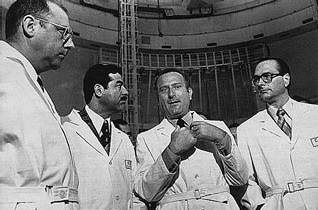 The Telegraph writes: 'In 1975, [Saddam] visited France and Jacques Chirac, then prime minister, took him on a tour of Provence. M Chirac went on to sell Saddam a nuclear reactor for £2 billion and signed a Nuclear Co-operation Treaty. This agreement bound Paris to help Saddam's nuclear programme and also excluded "all persons of Jewish origin" from participating, whether in France or Iraq. M Chirac insisted that the nuclear reactor and technical help were for civilian purposes. Saddam was more honest. "The agreement with France is the first concrete step toward production of the Arab atomic bomb," he said.' 'They negotiated the sale to Iraq of two French nuclear reactors. One of them was destroyed in an air raid [Operation Opera] by the Israelis in 1981 amid fears that Iraq was developing a nuclear weapon. France also agreed to provide Iraq with 133 Mirage F1 jet fighters over a 10-year period. It is reckoned that during the 1980s, 40% of France's arms exports went to Iraq', writes de BBC. In the documentary Saddam Hussein : Le procès que vous ne verrez pas (Saddam Hussein : The process that the world shall not see) broadcast by the Belgian Panorama (Canvas) on October 16, 2005 -and produced by the authors of the aforementioned article in Le Monde diplomatique- UPI Terrorism Correspondent Richard Sale says that, because the Iraqis were still learning how to fly the Mirages, French pilots flew missions for Iraq against Iran. Journalist Joe Trento states in the documentary that Iraqi soldiers were trained in the use of guerilla tactics in the US by the Green Berets. The Telegraph writes: 'In 1975, [Saddam] visited France and Jacques Chirac, then prime minister, took him on a tour of Provence. M Chirac went on to sell Saddam a nuclear reactor for £2 billion and signed a Nuclear Co-operation Treaty. This agreement bound Paris to help Saddam's nuclear programme and also excluded "all persons of Jewish origin" from participating, whether in France or Iraq. M Chirac insisted that the nuclear reactor and technical help were for civilian purposes. Saddam was more honest. "The agreement with France is the first concrete step toward production of the Arab atomic bomb," he said.' 'They negotiated the sale to Iraq of two French nuclear reactors. One of them was destroyed in an air raid [Operation Opera] by the Israelis in 1981 amid fears that Iraq was developing a nuclear weapon. France also agreed to provide Iraq with 133 Mirage F1 jet fighters over a 10-year period. It is reckoned that during the 1980s, 40% of France's arms exports went to Iraq', writes de BBC. In the documentary Saddam Hussein : Le procès que vous ne verrez pas (Saddam Hussein : The process that the world shall not see) broadcast by the Belgian Panorama (Canvas) on October 16, 2005 -and produced by the authors of the aforementioned article in Le Monde diplomatique- UPI Terrorism Correspondent Richard Sale says that, because the Iraqis were still learning how to fly the Mirages, French pilots flew missions for Iraq against Iran. Journalist Joe Trento states in the documentary that Iraqi soldiers were trained in the use of guerilla tactics in the US by the Green Berets.
US coaxed Iraq into war against Iran
Military help followed
In the same documentary it was revealed what precipitated the attack by Iraq on Iran, on September 22, 1980. 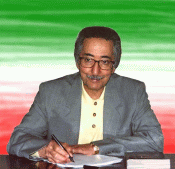 Former Prime Minister of Iran, Abdolhassan Bani Sadr, says in the documentary that the US presented Iraq with plans in a Paris hotel which exaggerated the ease of an attack and subsequent victory over Iran. Richard Sale confirms this in the documentary. 'A top-secret US government document from 1984 reveals that "President Carter gave the Iraqis a green light to launch the war against Iran"', writes Le Monde diplomatique: 'He [Bani Sadr] claims that Iranian secret services acquired a copy of this plan which, according to his sources, had been drawn up by the Iraqis and Americans in a Paris hotel. "I'll tell you why I know it's genuine: because the Iraqis conducted the war exactly according to this battle plan. It was only because we had a copy that we were able to withstand their attacks". [...] Several former senior US diplomatic officials have admitted to Richard Sale that the US contributed to the battle plan.' Former Prime Minister of Iran, Abdolhassan Bani Sadr, says in the documentary that the US presented Iraq with plans in a Paris hotel which exaggerated the ease of an attack and subsequent victory over Iran. Richard Sale confirms this in the documentary. 'A top-secret US government document from 1984 reveals that "President Carter gave the Iraqis a green light to launch the war against Iran"', writes Le Monde diplomatique: 'He [Bani Sadr] claims that Iranian secret services acquired a copy of this plan which, according to his sources, had been drawn up by the Iraqis and Americans in a Paris hotel. "I'll tell you why I know it's genuine: because the Iraqis conducted the war exactly according to this battle plan. It was only because we had a copy that we were able to withstand their attacks". [...] Several former senior US diplomatic officials have admitted to Richard Sale that the US contributed to the battle plan.'
The support didn't stop there: 'Although Washington was officially neutral in the Iran - Iraq war , a US commission of inquiry has revealed that the White House and the CIA secretly supplied weapons, including fragmentation bombs, to Saddam Hussein. US satellite intelligence allowed Irani an troops to be more effectively targeted; Washington was aware that Iraqi units were using chemical weapons. According to Rick Francona, then an officer with US military intelligence, the lists of bombing targets he gave Iraqis in 1988 secured Iraq 's final victory over Iran'.
Western countries lent support to Iraq
Bush supported both Iran and himself 'In 1987, a French paper published a letter written to Saddam Hussein by Jacques Chirac a few months previously. It began: "My dear friend." [...] many other Western countries - including the United States, Britain, West Germany and Italy - also helped Iraq with equipment and expertise, both civilian and military, and with finance.' All this out of fear of Iran. 'In the early 1980s, the bogeyman for the Americans was Ayatollah Khomeini. He had come to power in Iran during the 1979 Islamic revolution.' This explains the support, also from the US, for Iraq - support which blossomed during a visit by 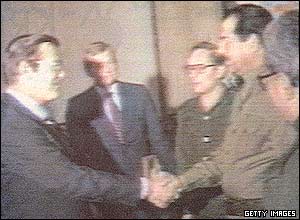 Rumsfeld to Saddam (see part two of this series): 'President Reagan determined nevertheless that Iraq should be supported and he sent Mr Rumsfeld to Baghdad with a personal letter from himself to Saddam Hussein', wrote the BBC. Reagan was president because Carter had lost the 1980 election due to his mishandling of the hostage crisis at the American embassy in Tehran. Running totally contrary to the anti-Iranian sentiment and policy held by Americans at that time, the Iranian regime was provided with weapons and cash in 1980 by George Bush, father of George W. Bush. The weapons and cash were exchanged for the pledge by the Iranians to hold onto the American hostages a little longer. The goal of this operation October Surprise was for Carter to fail in his efforts to free the hostages so that Reagan would end up getting elected president (with Bush becoming vice-president). And so it came to pass. Read more about the October Surprise in this article DeepJournal wrote for Esquire.
US misled Iraq into war against Kuwait
'The war with Iran [from 1980 to 1988] had saddled Iraq with £50 billion of debts and a reconstruction bill exceeding £140 billion. By 1989, Saddam's creditors were taking over half of his oil revenues', wrote The Telegraph. In any case part of the money, 6 billion dollars, was traced from Rome to the US. But more importantly, Kuwait began producing more oil in the period right after the war, as is explained in the documentary Hidden Wars of Desert Storm. 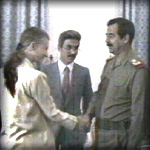 This did not bode well for the market price for Saddam's oil, and on top of that, part of the oil that Kuwait was producing was coming from Iraq: 'Using equipment bought from National Security Council chief Brent Scowcroft's old company, Kuwait was pumping out some $14-billion worth of oil from underneath Iraqi territory. Even the territory they were drilling from had originally been Iraq's', as reported in the book The CIAs Greatest Hits. When Saddam then wanted to annex Kuwait, the American ambassador in Iraq, April Glaspie, effectively gave him the green light. In order to then make a war against Iraq totally feasible, the Saudis were duped with doctored photographs showing Iraqi troops on the border with Kuwait (see this DeepJournal). After that the world was fooled by a media campaign thought up by a PR firm (see this DeepJournal). This did not bode well for the market price for Saddam's oil, and on top of that, part of the oil that Kuwait was producing was coming from Iraq: 'Using equipment bought from National Security Council chief Brent Scowcroft's old company, Kuwait was pumping out some $14-billion worth of oil from underneath Iraqi territory. Even the territory they were drilling from had originally been Iraq's', as reported in the book The CIAs Greatest Hits. When Saddam then wanted to annex Kuwait, the American ambassador in Iraq, April Glaspie, effectively gave him the green light. In order to then make a war against Iraq totally feasible, the Saudis were duped with doctored photographs showing Iraqi troops on the border with Kuwait (see this DeepJournal). After that the world was fooled by a media campaign thought up by a PR firm (see this DeepJournal).
Lying and deceit as weapon against Saddam and the rest of the world
Shortly after the 'end' of the Iraq war in 2003, Slate wrote about 'Centcom's real secret weapon' in the Iraq war: not so much smart bombs as smart bribes: 'A fascinating piece in the May 19 Defense News quotes Gen. Tommy Franks, chief of U.S. Central Command, confirming what had until now been mere rumors picked up by dubious Arab media outlets—that, before Gulf War II began, U.S. special forces had gone in and bribed Iraqi generals not to fight.' Frank Kaplan of Slate wonders whether the officers, who can be heard on the audiotapes presented by the then-Secretary 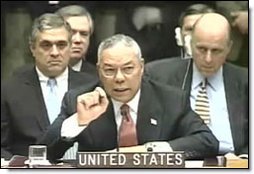 of State Colin Powell during his February 2003 appearance in front of the UN Security Council, were in fact among the personnel bribed. Powell claimed to know that one of the men on the tapes was a general; beyond that the speakers on the tapes were never identified. of State Colin Powell during his February 2003 appearance in front of the UN Security Council, were in fact among the personnel bribed. Powell claimed to know that one of the men on the tapes was a general; beyond that the speakers on the tapes were never identified.
Later on his appearance came to be seen as misleading; even during the preparations Powell, it seems, had difficulty with it, as reported by USNews: 'At one point during the rehearsal, Powell tossed several pages in the air. "I'm not reading this," he declared. "This is bulls- - -."' Powell went in front of the UN Security Council anyway, and now he regrets it. In reference to an interview that Powell gave to Barbara Walters, ABC reports: 'When asked if he feels it has tarnished his reputation, he said, "Of course it will. It's a blot. I'm the one who presented it on behalf of the United States to the world, and [it] will always be a part of my record. It was painful. It's painful now."'
James Bond director made feature film for SaddamBribing Saddam wasn't really an option because he wasn't interested in money, wrote The Atlantic Monthly in May of 2002: 'What does Saddam want? By all accounts, he is not interested in money. This is not the case with other members of his family. His wife, Sajida, is known to have gone on million-dollar shopping sprees in New York and London, back in the days of Saddam's good relations with the West. Uday drives expensive cars and wears custom-tailored suits of his own design. Saddam himself isn't a hedonist; he lives a well-regulated, somewhat abstemious existence. He seems far more interested in fame than in money, desiring above all to be admired, remembered, and revered. A nineteen-volume official biography is mandatory reading for Iraqi government officials, and Saddam has also commissioned [in 1980] a six-hour film about his life, called The Long Days, which was edited [and directed] by Terence Young, best known for directing three James Bond films. Saddam told his official biographer that he isn't interested in what people think of him today, only in what they will think of him in five hundred years. The root of Saddam's bloody, single-minded pursuit of power appears to be simple vanity.' - It is always good when a crook gets rounded up, especially if he is the leader of a bunch of other crooks. But what if a crook ends up standing trial when it never really was the goal to try him in the first place, and has to be regarded as a by-product? What if that by-product is the result of an expedition carried out by lying and deceit? What if the spoils of war have already been extracted and the by-product is depicted as being the main objective by way of the same lying and deceit? What if the main objective derives its reason for being from those who are now passing judgment on him? The world is infested with crooks. All of those crooks have the right to be convicted, not just the by-product manufactured by the U.S. As is apparent from his relations with the West, Saddam has much to tell. Now that one [Nov 10: and a second one] of his lawyers has been murdered, his defense team would like to have him tried abroad out of concern for safety, in The Hague for example. But the president of the International Court of Justice says that the rules will not allow this.
Fallujah - The Hidden Massacre
____________________________________________________________________________
DeepJournal
Sign up for the free mailing list.
|
|
|
|
12 September 2013 | 
Why is Syria under attack? - Part 4
When you peek below the surface, it becomes clear that Syria is under attack due to the interests of the parties involved. ‘Syria’ is about power, money, influence and energy.
10 September 2013 | 
Why is Syria under attack? - 3
8 September 2013 | 
Why is Syria under attack? - Part 2
In the event of major military conflicts that risk considerable humanitarian and economic consequences, it is useful to examine the interests of all parties involved as well as the role that the media plays in reporting the events.
7 September 2013 | 
Why is Syria under attack? - Part 1
On the surface it’s straightforward: the U.S. wants to liberate Syria from a brutal dictator who is attacking his own people with poison gas. But beneath the surface there is something very different going on.
28 August 2012
Daan de Wit (DeepJournal) interviewt Webster Tarpley op het Magneetfestival
Het Magneetfestival gaat de diepte in met vier interviews. Daan de Wit interviewt Webster Tarpley, Albert Spits, en Mike Donkers.
|
|
|
|
|

 mail this article
|
mail this article
|
 print
|
print
| 

 Rumsfeld to Saddam (see part two of this series): 'President Reagan determined nevertheless that Iraq should be supported and he sent Mr Rumsfeld to Baghdad with a personal letter from himself to Saddam Hussein', wrote the BBC. Reagan was president because Carter had lost the 1980 election due to his mishandling of the hostage crisis at the American embassy in Tehran. Running totally contrary to the anti-Iranian sentiment and policy held by Americans at that time, the Iranian regime was provided with weapons and cash in 1980 by George Bush, father of George W. Bush. The weapons and cash were exchanged for the pledge by the Iranians to hold onto the American hostages a little longer. The goal of this operation October Surprise was for Carter to fail in his efforts to free the hostages so that Reagan would end up getting elected president (with Bush becoming vice-president). And so it came to pass. Read more about the October Surprise in this article DeepJournal wrote for Esquire.
Rumsfeld to Saddam (see part two of this series): 'President Reagan determined nevertheless that Iraq should be supported and he sent Mr Rumsfeld to Baghdad with a personal letter from himself to Saddam Hussein', wrote the BBC. Reagan was president because Carter had lost the 1980 election due to his mishandling of the hostage crisis at the American embassy in Tehran. Running totally contrary to the anti-Iranian sentiment and policy held by Americans at that time, the Iranian regime was provided with weapons and cash in 1980 by George Bush, father of George W. Bush. The weapons and cash were exchanged for the pledge by the Iranians to hold onto the American hostages a little longer. The goal of this operation October Surprise was for Carter to fail in his efforts to free the hostages so that Reagan would end up getting elected president (with Bush becoming vice-president). And so it came to pass. Read more about the October Surprise in this article DeepJournal wrote for Esquire.  But the use of poison gas has also become a reality in the current war in Iraq, as is made
But the use of poison gas has also become a reality in the current war in Iraq, as is made  The Telegraph
The Telegraph  Former Prime Minister of Iran, Abdolhassan Bani Sadr, says in the documentary that the US presented Iraq with plans in a Paris hotel which exaggerated the ease of an attack and subsequent victory over Iran. Richard Sale confirms this in the documentary. 'A top-secret US government document from 1984 reveals that "President Carter gave the Iraqis a green light to launch the war against Iran"',
Former Prime Minister of Iran, Abdolhassan Bani Sadr, says in the documentary that the US presented Iraq with plans in a Paris hotel which exaggerated the ease of an attack and subsequent victory over Iran. Richard Sale confirms this in the documentary. 'A top-secret US government document from 1984 reveals that "President Carter gave the Iraqis a green light to launch the war against Iran"',  This did not bode well for the market price for Saddam's oil, and on top of that, part of the oil that Kuwait was producing was coming from Iraq: 'Using equipment bought from National Security Council chief Brent Scowcroft's old company, Kuwait was pumping out some $14-billion worth of oil from underneath Iraqi territory. Even the territory they were drilling from had originally been Iraq's', as
This did not bode well for the market price for Saddam's oil, and on top of that, part of the oil that Kuwait was producing was coming from Iraq: 'Using equipment bought from National Security Council chief Brent Scowcroft's old company, Kuwait was pumping out some $14-billion worth of oil from underneath Iraqi territory. Even the territory they were drilling from had originally been Iraq's', as  of State Colin Powell during his February 2003
of State Colin Powell during his February 2003